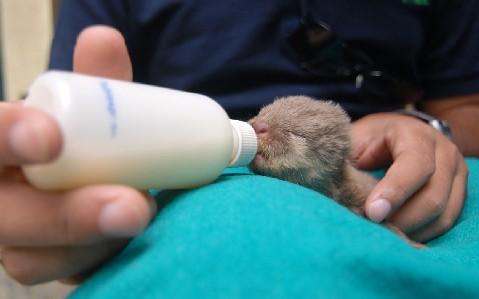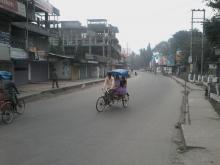Three smooth-coated otter pups rescued from the floods in Kaziranga National Park last week are currently being hand-reared at the Centre for Wildlife Rehabilitation and Conservation (CWRC).
The pups, all male, yet to open their eyes, were found floating on hyacinth leaves by local people in Mahpora (Dagaon) from the fringes of the National Park, last Friday.
“The people apparently found the pups while they were fishing. They handed over the pups to the Forest Department staff, who called us to collect them as they could not locate the mother or their den,” said Dr Anjan Talukdar, International Fund for Animal Welfare – Wildlife Trust of India (IFAW-WTI) veterinarian.
The pups are being bottle-fed and looked after by the CWRC veterinarians and animal keepers.
This is the first instance of the species being admitted to CWRC, a rehabilitation facility run by the Assam Forest Department and IFAW-WTI. One adult, however, was rescued and released by IFAW-WTI team in 2009 in Manas Tiger Reserve.
“Since we started working in CWRC more than a decade ago, this is the first instance of otters being rescued in central Assam (despite Kaziranga being a wetland deemed with otters) for two reasons,” said Dr Ashraf, Senior Director, WTI. “First, otters are aquatic and thus floods generally do not have any impact on them and, second, conflict with humans is negligible or practically absent since otters cannot coexist in areas where human activities dominate. A few hundred years ago, all major and minor perennial streams, rivers and beels in Assam would have been occupied by otters.”
WTI has also earlier supported a Rapid Action Project (RAP) in Vikramshila Gangetic Dolphin Sanctuary in Bihar to hand-rear a pup rescued from poachers. The pup was successfully hand-reared and rehabilitated in the sanctuary by a team of TM Bhagalpur University.
“The rehabilitation method to be followed is like IFAW-WTI’s 'walk the bear' or elephant reintegration programmes...only in this case, the foster mother will have to 'swim the otters' at the release site for certain period of time, with supplementary fish,” Dr Ashraf added.
Smooth-coated otter (Lutrogale perspicillata) is found across south and southeast Asia and is listed under vulnerable category in the IUCN Red List. It is listed in schedule II of the Indian Wildlife (Protection) Act, 1972.





Add new comment